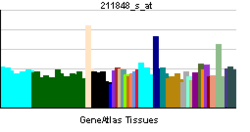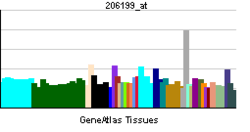CEACAM7
| Carcinoembryonic antigen-related cell adhesion molecule 7 | |||||||||||
|---|---|---|---|---|---|---|---|---|---|---|---|
| Identifiers | |||||||||||
| Symbols | CEACAM7 ; CEA; CGM2 | ||||||||||
| External IDs | HomoloGene: 48476 GeneCards: CEACAM7 Gene | ||||||||||
| |||||||||||
| RNA expression pattern | |||||||||||
 | |||||||||||
 | |||||||||||
 | |||||||||||
| More reference expression data | |||||||||||
| Orthologs | |||||||||||
| Species | Human | Mouse | |||||||||
| Entrez | 1087 | n/a | |||||||||
| Ensembl | ENSG00000007306 | n/a | |||||||||
| UniProt | Q14002 | n/a | |||||||||
| RefSeq (mRNA) | NM_001291485 | n/a | |||||||||
| RefSeq (protein) | NP_001278414 | n/a | |||||||||
| Location (UCSC) | Chr 19: 41.67 – 41.71 Mb | n/a | |||||||||
| PubMed search | n/a | ||||||||||
Carcinoembryonic antigen-related cell adhesion molecule 7 is a protein that in humans is encoded by the CEACAM7 gene.[1][2][3]
References
- ↑ Thompson J, Zimmermann W, Nollau P, Neumaier M, Weber-Arden J, Schrewe H, Craig I, Willcocks T (Jan 1995). "CGM2, a member of the carcinoembryonic antigen gene family is down-regulated in colorectal carcinomas". J Biol Chem 269 (52): 32924–31. PMID 7806520.
- ↑ Thompson J, Seitz M, Chastre E, Ditter M, Aldrian C, Gespach C, Zimmermann W (May 1997). "Down-regulation of carcinoembryonic antigen family member 2 expression is an early event in colorectal tumorigenesis". Cancer Res 57 (9): 1776–84. PMID 9135022.
- ↑ "Entrez Gene: CEACAM7 carcinoembryonic antigen-related cell adhesion molecule 7".
Further reading
- Douard R, Wind P, Sales JP et al. (2006). "Long-term prognostic value of detection of circulating colorectal cancer cells using CGM2 reverse transcriptase-polymerase chain reaction assay.". Surgery 139 (4): 556–62. doi:10.1016/j.surg.2005.09.025. PMID 16627067.
- Gerhard DS, Wagner L, Feingold EA et al. (2004). "The status, quality, and expansion of the NIH full-length cDNA project: the Mammalian Gene Collection (MGC).". Genome Res. 14 (10B): 2121–7. doi:10.1101/gr.2596504. PMC 528928. PMID 15489334.
- Zhang Z, Henzel WJ (2005). "Signal peptide prediction based on analysis of experimentally verified cleavage sites.". Protein Sci. 13 (10): 2819–24. doi:10.1110/ps.04682504. PMC 2286551. PMID 15340161.
- Grimwood J, Gordon LA, Olsen A et al. (2004). "The DNA sequence and biology of human chromosome 19.". Nature 428 (6982): 529–35. doi:10.1038/nature02399. PMID 15057824.
- Strausberg RL, Feingold EA, Grouse LH et al. (2003). "Generation and initial analysis of more than 15,000 full-length human and mouse cDNA sequences.". Proc. Natl. Acad. Sci. U.S.A. 99 (26): 16899–903. doi:10.1073/pnas.242603899. PMC 139241. PMID 12477932.
- Schölzel S, Zimmermann W, Schwarzkopf G et al. (2000). "Carcinoembryonic antigen family members CEACAM6 and CEACAM7 are differentially expressed in normal tissues and oppositely deregulated in hyperplastic colorectal polyps and early adenomas.". Am. J. Pathol. 156 (2): 595–605. doi:10.1016/S0002-9440(10)64764-5. PMC 1850034. PMID 10666389.
- Frängsmyr L, Baranov V, Hammarström S (1999). "Four carcinoembryonic antigen subfamily members, CEA, NCA, BGP and CGM2, selectively expressed in the normal human colonic epithelium, are integral components of the fuzzy coat.". Tumour Biol. 20 (5): 277–92. doi:10.1159/000030075. PMID 10436421.
- Kinugasa T, Kuroki M, Takeo H et al. (1998). "Expression of four CEA family antigens (CEA, NCA, BGP and CGM2) in normal and cancerous gastric epithelial cells: up-regulation of BGP and CGM2 in carcinomas.". Int. J. Cancer 76 (1): 148–53. doi:10.1002/(SICI)1097-0215(19980330)76:1<148::AID-IJC23>3.0.CO;2-7. PMID 9533775.
- Thompson JA, Mauch EM, Chen FS et al. (1989). "Analysis of the size of the carcinoembryonic antigen (CEA) gene family: isolation and sequencing of N-terminal domain exons.". Biochem. Biophys. Res. Commun. 158 (3): 996–1004. doi:10.1016/0006-291X(89)92821-0. PMID 2537643.
- Khan WN, Frängsmyr L, Teglund S et al. (1992). "Identification of three new genes and estimation of the size of the carcinoembryonic antigen family.". Genomics 14 (2): 384–90. doi:10.1016/S0888-7543(05)80230-7. PMID 1427854.